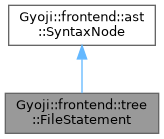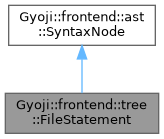#include <tree.hpp>
Inheritance diagram for Gyoji::frontend::tree::FileStatement:

Collaboration diagram for Gyoji::frontend::tree::FileStatement:

Public Member Functions | |
| const FileStatementType & | get_statement () const |
 Public Member Functions inherited from Gyoji::frontend::ast::SyntaxNode Public Member Functions inherited from Gyoji::frontend::ast::SyntaxNode | |
| SyntaxNode (Gyoji::context::TokenID _type, specific_type_t _data, const Gyoji::context::SourceReference &_source_ref) | |
| const std::vector< std::reference_wrapper< const SyntaxNode > > & | get_children () const |
| const Gyoji::context::TokenID & | get_type () const |
| template<class T > | |
| bool | has_data () const |
| template<class T > | |
| const T & | get_data () const |
| const SyntaxNode & | get_syntax_node () const |
| const Gyoji::context::SourceReference & | get_source_ref () const |
Detailed Description
A statement at the file level consists of one of the following types of statement.
- Function Definition : Definition of a function along with the statements that make it up.
- Function Declaration : Declaration of a function (a.k.a. a prototype).
- Global Definition : Definition of a global variable.
- Class Declaration : Forward declaration of a class with an incomplete type.
- Class Definition : Definition of a composite type with associated methods.
- Enum Definition : Definition of an enumerated list of symbolic values.
- Type Definition : Definition (usually an alias) for a primitive or class type.
- Namespace : Definition of a namespace with other statements contained inside it.
- Using Statement : Adds a namespace to the search path when resolving types or namespaces.
Member Function Documentation
◆ get_statement()
| const FileStatement::FileStatementType & FileStatement::get_statement | ( | ) | const |
Returns the details of a specific statement. The specific type of statement can be interrogated by determining if the variant "holds" the given type of data and then accessing the held statement.
Example usage:
const auto & stmt = fs.get_statement();
if (std::holds_alternative<FileStatementFunctionDefinition>(stmt)) {
const auto & function_def = std::get<Gyoji::owned<FileStatementFunctionDefinition>>(stmt);
}
The documentation for this class was generated from the following files:
- /home/jona/NetBeansProjects/jos/compiler/jlang2/src/frontend/gyoji-frontend/tree.hpp
- /home/jona/NetBeansProjects/jos/compiler/jlang2/src/frontend/tree.cpp